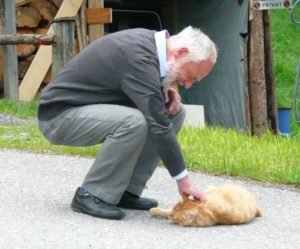Why is it that people don’t really listen to each other? Oh, they hear one another, but not what’s lying between the lines and under the words, not the emotional content, not the things – unconsciously hidden or not – that the other is saying, not the “where is this coming from?” question we should all ask when someone else is speaking to us.
Not all conversations are fraught with emotional content, but all are driven by who the other person really is.
People often just want to have the “last word.” Or they want to prove their superior knowledge of the subject. Or even humiliate their interlocutor with a “grand slam.” Some simply reply with an irrelevant acknowledgement that words have been heard, if not really understood.
I have often wondered at the failure of communications between people, especially in personal relationships where the stakes can be so high. Someone has to “win,” so the words of the other are barely heard.
I believe this is a product of our hurry-up western culture. We don’t take the time any more to sit quietly and absorb what the other is saying, think about it a bit, and then try to offer some response that will further the discussion in a positive way. Indigenous cultures do this. They make a ritual of important conversations, passing a pipe, or a feather or noise-maker of some kind so that the one given the portentous object knows that it is her turn to speak without interruption and that all the others will really hear – and think about – what she is saying. Then, in a very democratic way, the ritual object is passed to the next person, who may take quite a while in forming a thoughtful response. In this way, important decisions of the group are made, and every participant is satisfied that he has been heard.
How did we lose this?
It’s a stress-filled world we live in, and all relationships – from the personal to the business – suffer for it. I am reminded of when I was a young public relations consultant out on my own visiting my first referral, a psychological management consulting firm. We had a cordial greeting in reception and went into his office. I took my notebook out of my briefcase and prepared to make notes as we talked. I asked questions. We spoke, or rather the potential client responded to my questions, for about an hour. And at the end of my note-taking, with a fair understanding of what was needed, I shoved my notebook into my briefcase and started to pull myself out of my chair.
“One moment,” he said. “Why don’t you tell me something about yourself?” I’m sure my face reddened as I planted myself back in my chair. I had no rehearsed phrases about my experience or expertise and I fumbled my responses for an embarrassing 15 minutes. I learned that, in whatever relationship, the communication needs to open up in both directions, with both parties listening carefully. My new client was a psychologist, and I was intimidated (I’ve always believed psychologists have this magical ability to see right through you), so I failed to remember that he needed to know something about me other than that I was a good, but shy, listener.
I later invited a man with superior experience into the firm – a creative guy, who was more entranced with his own creative input than with the client’s real needs or budget. With my ability to listen, I was able to temper his impulsive responses, but the partnership didn’t last long.
All lessons learned. Now I know to quiet myself inside when someone else is speaking – especially people I love – so that I can offer the most thoughtful, even wise, responses. This has taken a lifetime to work on and get right. And I’m in no way perfect. I have just learned to leave my own little ego in the pasture while I really hear what the other person is saying. And sometimes it makes me want to cry, because the process of listening from the heart, as well as the head, activates empathy – a precious commodity these days, and something every writer must cultivate.
© 2018, Sandra Shaw Homer

